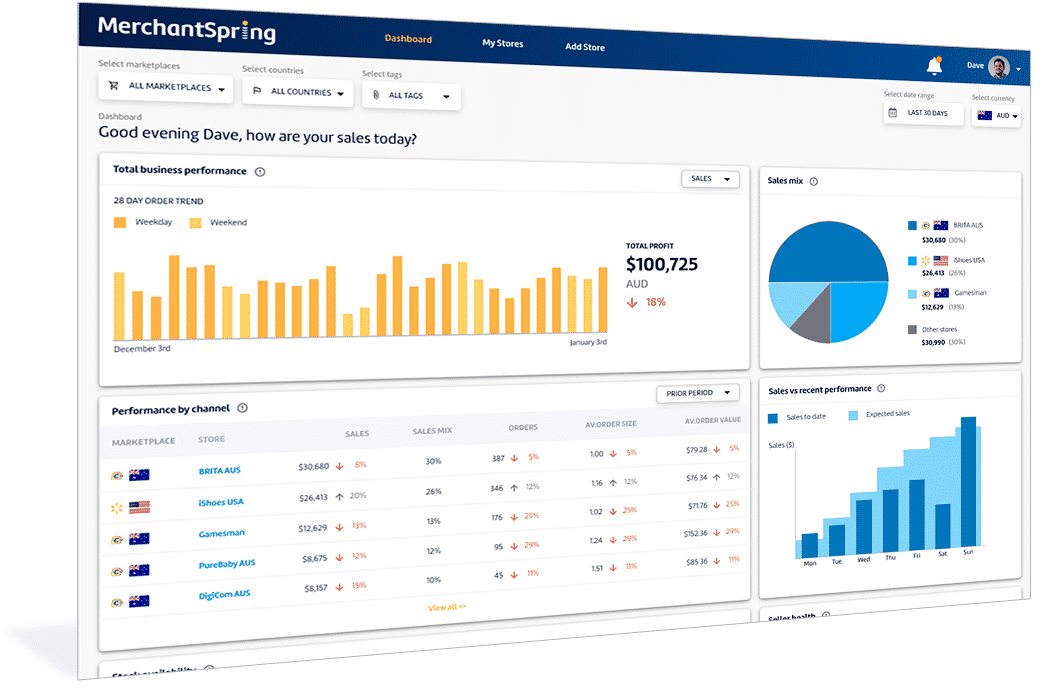Proven Strategies for Safeguarding Your Client's Amazon Account Health
Maintaining seller health is crucial
Any company that wants to be successful on Amazon needs to maintain seller health. The total performance of a seller's account on Amazon is referred to as "Amazon seller health," and includes statistics like the order defect rate, cancel rate, and late dispatch rate. These statistics are significant because they influence a seller's capacity to uphold a positive reputation on the marketplace and to carry on selling their goods.
The capacity of a seller to keep selling on Amazon depends on maintaining seller health. A seller may get a performance notification or possibly have their account suspended if their performance indicators don't meet Amazon's standards. This could be disastrous for a seller's business because they might lose access to their stock, clientele, and capacity to make money on the site.
So, Seller Health... is something that's rarely talked about and it is super important to obviously maintain it because it affects so much including your potential mental health

Preserving seller health is essential for any company hoping to be successful on Amazon. Sellers may keep a positive reputation on the platform and continue to make money from their sales by closely monitoring their performance indicators and taking steps to improve them. Even though maintaining seller health might be difficult, it is crucial for any company that wants to succeed on Amazon.
Amazon's Order Defect Rate explained
The order defect rate is a critical indicator of a Seller's Health on Amazon. The percentage of orders that have a defect, such as a product that arrives in poor condition or a high return rate, is known as the Order Defect Rate. High Order Defect Rates are viewed by Amazon as a serious problem for sellers because they can have a negative effect on their performance metrics and reputation in the marketplace.
Amazon tells merchants on their order defect rate via a variety of channels, including platform messaging, email notifications, and in rare cases, phone calls. Sellers must take note of these messages and act to decrease their order defect rate because failing to do so could result in account suspension or termination.
High-Risk Categories

Topicals and consumables are two examples of categories that Amazon considers to be high-risk. As a result, sellers in these categories may see more performance notifications relating to product safety issues, making false claims, and complaints about the authenticity of their products. A to Z claims, or customer requests for refunds or other settlements, were a major problem for sellers in the past but seem to be less prevalent currently.
A seller will only have a certain amount of time to improve their metrics if Amazon determines that their account is at risk as a result of their order defect rate or other performance metrics before their account is suspended or cancelled. The number and seriousness of notifications received determine how much time is allotted.
Address Amazon notifications immediately
Responding right away to Amazon notifications is one of the most important methods to maintain seller health. A seller must take an Amazon notification seriously and act quickly upon receiving it. These messages might range from simple cautions to requests for the seller to submit a plan of action (POA) to fix the problem.
It is crucial to follow a precise format when submitting a POA. The first piece ought to explain the underlying cause of the problem and acknowledge that the seller broke Amazon's rules. The seller's prompt response to address the issue should be described in the second section. The steps the seller is doing to ensure that the problem doesn't arise again should be covered in the final section.
Responding to Amazon notifications right away is essential for keeping sellers in good standing. Sellers may make sure that their account is kept in good standing and that they can continue to make money from their sales by taking these notifications seriously and providing a well-structured POA. Even if it could be difficult, staying on top of alerts is crucial for any business that wants to succeed on Amazon.
Call Amazon for account reactivation
Account cancellation is among the worst alerts an Amazon merchant may get. This may be a fatal blow to a company that depends on Amazon for sales. For those who find themselves in this circumstance, there is hope. Sellers can work to have their account reactivated by phoning Amazon and providing a well-organized plan of action (POA).
So, you certainly want to try not to have the same performance notification more than once. You definitely want to try to avoid that at all costs.

If a seller finds themselves in the terrible situation of having their account cancelled, they must immediately phone Amazon to request account reactivation. Sellers can improve their chances of having their account reinstated by filing a well-organized POA and asking Amazon for advice. By paying attention to notifications and abstaining from repeat offences, sellers can actively retain their good standing on Amazon.
Preventive measures to consider
The value of auditing, planning, predicting, organising, and building a library of responses for Amazon seller accounts is one of the podcast's most important insights. Creating a detailed Auditing of accounts is important to make sure that the firm is operating smoothly in all respects and that the account is in good standing. To better understand the kinds of problems that have happened in the past and how they were handled, this involves looking over performance notifications.
Valerie Bleus advises building a library of replies for various performance notifications in order to prepare for unexpected problems. To prepare for potential warnings, this library can be organised into business categories like consumables or topicals. Sellers can swiftly reply to notifications and prevent being a repeat offender by having a set of responses at their disposal. Reading customer reviews to comprehend any prospective complaints or problems. This can assist sellers in getting ready for any notifications and proactively resolving any concerns.
Institutionalize learnings for agency success.

But these measures shouldn't merely be taken by lone merchants. To assure their success, agencies that work with several Amazon merchants must institutionalise these lessons. Agencies gain from reviewing numerous plans of action each month, which offers insightful information and accumulated knowledge.
Working with a consultant like Valerie Bleus of Brand Side Marketing might be beneficial for smaller agencies that might not have the resources or knowledge inside. Consultants might be brought in to evaluate the problems the agency is having and offer suggestions and strategies for solving them. To avoid account deactivation and other problems, this may entail implementing procedures and audits.
Institutionalising lessons learned is essential for agency success on Amazon, in general. Agencies can provide better service to their clients and prevent potentially harmful account deactivations by gathering and sharing knowledge. To ensure their success on the platform, agencies must be proactive and well-prepared, whether through internal procedures or collaboration with outside consultants.
Account Health in MerchantSpring
Monitoring your products in a more diverse and faster way is a trend in this fast-moving world of e-commerce. MerchantSpring introduces this Account Health feature to help sellers and agencies stay on top of these seller health issues.

This provides you with great insights as to where you need to fix inventory issues in order to drive sales.

You can easily monitor which particular metric you are out of line, with which triggered the health status from being downgraded, from being good to at risk or worst case scenario, being closed or suspended. It also provides the customer service performance status, order defect rate, a to z guarantee claims, chargebacks claims, and negative feedbacks. Also, it can track metrics that have issues on policy compliance like listing policy violations, received product safety complaints, restricted product policy violations, food and product safety issues, product authenticity customer complaints, received intellectual property complaints, suspected intellectual property violations and other policy violations.
MerchantSpring is multi-channel analytics dashboard and reporting solution that not only provides you the positive reports but also gives you a picture of your whole account as well. It presents extensive drill down capabilities, reporting and notification features all in a single platform. A very concise platform that sellers/vendors need to maximise its full potential.
Want to learn more? Click on the button below and experience the wonders that our platform can do to help you skyrocket your sales!










Add a Comment